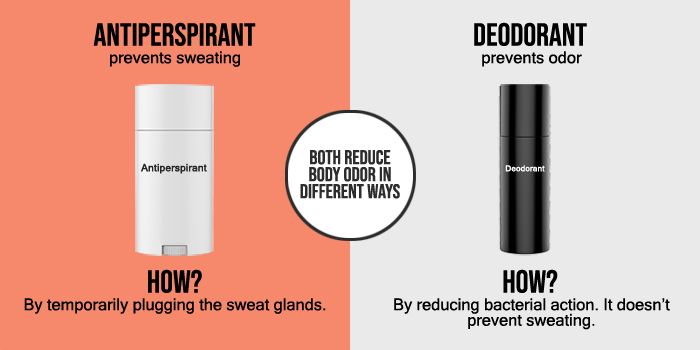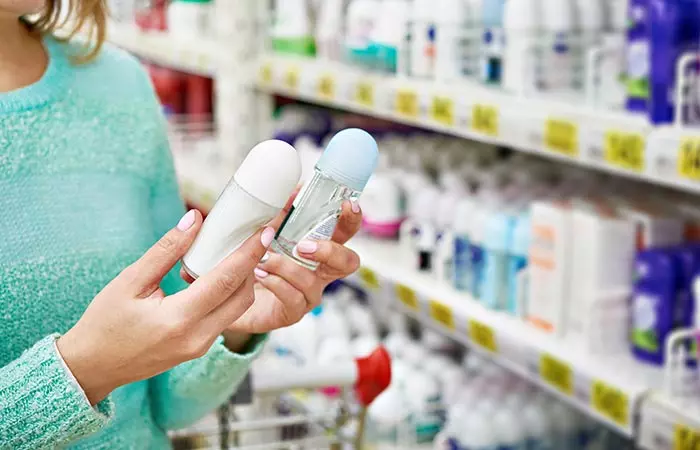Antiperspirants Vs. Deodorants – What’s The Difference?

Image: shutterstock
Antiperspirant or deodorant – which one did you use today before stepping out?
How does it matter anyway? Aren’t they both the same? No. Every day, you spray, dab, or roll on your favorite antiperspirant or deodorant to smell fresh all day long. They may look similar, but there is a big difference between antiperspirants and deodorants. In this article, we will help you understand the difference and pick the right one for you. Keep scrolling.
Antiperspirant Vs. Deodorants: Is There Any Difference?
Yes. They are different.
Most of us use deodorant to prevent body odor and sweating, especially in the armpits. But body odor and sweating are two different things.
Sweat has no odor or color. If you think that it is your sweat that stinks, you are wrong. Body odor is a result of your sweat mixing with the bacteria on your skin. A deodorant helps fight the bacteria to prevent body odor.
However, a deodorant cannot stop you from sweating. This is where an antiperspirant can help. The antiperspirant plugs the sweat glands on your skin for some time. This helps reduce the amount of sweat.
The FDA classifies antiperspirant as an OTC drug, and it recognizes this product as safe for human use (1). You can buy deodorants and antiperspirants from any drugstore or supermarket. Prescription antiperspirants are also available for people who sweat excessively (hyperhidrosis).
Deodorants and antiperspirants have a long history. Even the ancient Greeks and Romans used fragrances to mask their body odor. It was only in 1888 that the first deodorant called ‘Mum’ was launched. It had a cream formulation that was supposed to be applied with your fingers.
Both the products not only keep you smelling fresh all day long but also do a ton of good to your skin. Let’s find out.
Are There Any Benefits Of Using Antiperspirants And Deodorants?
There are some positive effects of using deodorants and antiperspirants. The skin on your armpit has a separate microbiome, which is affected by these products.
In a study, 18 subjects were made to use both deodorant and antiperspirant alternatively for eight days. This included control days when the participants did not use any of the products. The researchers found that using both the products affected the bacterial colony in the armpits. However, the effect of the deodorant on the bacterial colony was modest and not as strong as the antiperspirant owing to its ingredients. The microbe colony increased after the participants discontinued using the products (2).
While this is good news, there is a flip side to these products that are linked to breast cancer. Let’s find out the truth.
Are Antiperspirants And Deodorants Linked To Breast Cancer?
Several studies have found a possible connection because deodorants and antiperspirants may contain harmful chemicals. Moreover, your armpits (where you usually apply these products) are close to your breasts.
One study evaluated the lifestyle habits (including the use of deos and antiperspirants) of cancer patients, suggesting a connection between these habits and cancer (3).
Another study also suggested a possible link between these underarm cosmetics and cancer of the upper outer quadrant of the breast (the part closest to the armpits) (4).
However, these studies are not conclusive and do not establish a connection. Even the National Cancer Institute has stated that none of the scientific evidence links antiperspirants and deodorants to breast cancer development (5).
Some studies did not find any connection between these products and cancer. A study conducted in Iraq involving 54 cases of breast cancer concluded that antiperspirants have no connection with breast cancer (6).
Hence, there is no need to panic and throw away the antiperspirants and deos that you were using all these days. However, there are several ingredients used in these products that you must avoid as much as possible.
Choosing The Right Deodorant Or Antiperspirant: Ingredients You Need To Avoid
1. Aluminum (And Aluminum-based Compounds)
Aluminum is the active ingredient found in antiperspirants and the reason why they are linked to cancer. A study suggests that when aluminum (or similar compounds) used in antiperspirants and deodorants is left on the skin, it may get absorbed and have identical effects like estrogen. This hormone can cause the growth of cancer cells in the breast (7).
Another study suggests that aluminum may directly affect the breast by disrupting its microenvironment and causing alterations in the cells (8). This is why researchers link antiperspirants and deodorants to breast cancer.
Therefore, avoid any deodorant or antiperspirant that contains aluminum or related compounds.
2. Alcohol
Alcohol is a common ingredient in all forms of antiperspirants and deodorants (roll-ons, sticks, gels, and sprays). Alcohol often causes dryness and skin irritation.
3. Fragrance
Odor-masking fragrances and perfumes may give you the feeling of freshness, but they can also cause skin irritation. Although all types of antiperspirants and deodorants contain some type of odor-masking fragrance, try to avoid the products that mention fragrance, perfume, or parfum in their ingredients list. Do this especially if you have sensitive skin.
4. Parabens
This is the most common preservative used in most cosmetic products that may cause skin irritation. Therefore, check for paraben-free formulas.
Now that you know the difference between antiperspirants and deodorants, check out the right way to use both in the next section.
How To Use Antiperspirants And Deodorants To Get The Most Out Of Them?
Deodorants are mainly meant for your armpits. Hence, it is better not to apply them to sensitive areas, such as the groin, under the breasts, and the bikini area. Always apply deodorant after taking a shower when your skin has dried completely.
Antiperspirants can be used on any body parts, including the underarms, feet, hands, chest, face, and back. (Consult a doctor before using it around your genitals). If you are using a prescription product, it is better to ask the doctor about the usage and application guidelines. Ideally, an antiperspirant should be applied at night before you hit the bed. This is the time when your sweat glands are not active, giving the product ample time to get activated. The strength of the antiperspirant depends on how much you sweat.
You may either buy an antiperspirant or a deodorant, depending on your needs. If you are looking for both odor- and sweat-control, you may even buy a combo product.
Do you have any more questions about deodorants and antiperspirants? Leave them in the comments section below, and we will get back to you.
8 sources
- Federal Register, Food And Drug Administration.
https://www.fda.gov/media/74236/download - The effect of habitual and experimental antiperspirant and deodorant product use on the armpit microbiome, PeerJ., US National Library of Medicine, National Institutes of Health.
https://www.ncbi.nlm.nih.gov/pmc/articles/PMC4741080/ - An earlier age of breast cancer diagnosis related to more frequent use of antiperspirants/deodorants and underarm shaving, European Journal of Cancer Prevention, US National Library of Medicine, National Institutes of Health.
https://www.ncbi.nlm.nih.gov/pubmed/14639125 - Underarm antiperspirants/deodorants and breast cancer, Controversies in Breast Cancer 2009, Breast Cancer Research, BMC.
https://breast-cancer-research.biomedcentral.com/articles/10.1186/bcr2424 - Antiperspirants/Deodorants and Breast Cancer, National Cancer Institute, National Institutes of Health.
https://www.cancer.gov/about-cancer/causes-prevention/risk/myths/antiperspirants-fact-sheet - Antiperspirant use as a risk factor for breast cancer in Iraq, Eastern Mediterranean Health Journal, US National Library of Medicine, National Institutes of Health.
https://www.ncbi.nlm.nih.gov/pubmed/17037719 - Aluminium, antiperspirants and breast cancer, Journal of Inorganic Biochemistry, US National Library of Medicine, National Institutes of Health.
https://www.ncbi.nlm.nih.gov/pubmed/16045991 - Aluminium and breast cancer: Sources of exposure, tissue measurements and mechanisms of toxicological actions on breast biology, Journal of Inorganic Biochemistry, US National Library of Medicine, National Institutes of Health.
https://www.ncbi.nlm.nih.gov/pubmed/23899626


















